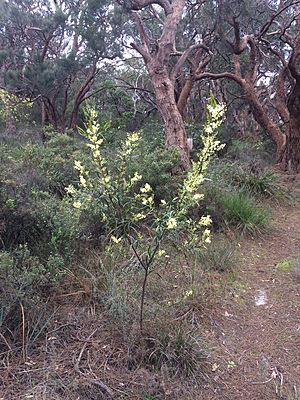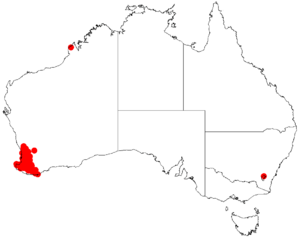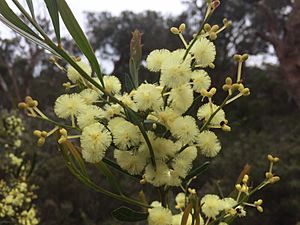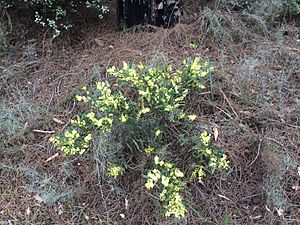Rib wattle facts for kids
Quick facts for kids Rib wattle |
|
|---|---|
 |
|
| A. nervosa upright habit | |
| Scientific classification |
|
| Kingdom: | Plantae |
| Clade: | Tracheophytes |
| Clade: | Angiosperms |
| Clade: | Eudicots |
| Clade: | Rosids |
| Order: | Fabales |
| Family: | Fabaceae |
| Clade: | Mimosoideae |
| Genus: | Acacia |
| Species: |
A. nervosa
|
| Binomial name | |
| Acacia nervosa |
|
 |
|
| Occurrence data from AVH | |
| Script error: The function "autoWithCaption" does not exist. | |
| Synonyms | |
|
Racosperma nervosum |
|
Script error: No such module "Check for conflicting parameters".
The Rib Wattle, also known as ribbed wattle or perfumed wattle, is a cool shrub. It belongs to a big group of plants called Acacia. This plant is native to parts of Western Australia.
Contents
What Does the Rib Wattle Look Like?
This shrub usually grows to be about 0.2 to 0.5 metres (0.7 to 1.6 ft) tall. It can stand up straight or spread out along the ground. The Rib Wattle blooms from June to October. During this time, it shows off bright yellow flowers.
The plant can have one main stem or many stems. These stems grow from a strong, woody root system. Its smaller branches are covered in a white, powdery coating called pruinose. They also have clear ribs or ridges.
The leaves of the Rib Wattle are not typical leaves. They are actually flattened leaf stems called phyllodes. These phyllodes are greyish-green and have a strong smell. They are usually 1 to 5 centimetres (0.4 to 2.0 in) long and 4 to 12 millimetres (0.157 to 0.472 in) wide.
The flowers grow in groups called inflorescences. Each group has two to four round flower heads. These heads are full of 7 to 12 bright golden flowers. After the flowers, the plant grows woody, dark brown seed pods. These pods are twisted and narrow. They can be up to 5 cm (2.0 in) long and 8 to 9 mm (0.315 to 0.354 in) wide. Inside the pods, you'll find shiny, greyish-brown seeds. They are about 3 to 4 mm (0.118 to 0.157 in) long.
How Scientists Name Plants
The Rib Wattle was first officially described in 1825. A botanist named Augustin Pyramus de Candolle gave it its scientific name, Acacia nervosa. This happened as part of his work on plants.
The very first sample of this plant, called a type specimen, was collected in 1801. It was found in Geographe Bay by Louis de Freycinet. He was part of an important expedition led by Nicolas Baudin.
The only other scientific name for this plant is Racosperma nervosum. This name was given by another botanist, Leslie Pedley.
The Rib Wattle is part of a group of plants called the Acacia myrtifolia group. This group also includes other smaller wattle plants. Some examples are Acacia obovata and Acacia pygmaea.
Where Does the Rib Wattle Grow?
The Rib Wattle naturally grows in certain areas of Western Australia. You can find it in the Great Southern, South West, and Peel regions.
It likes to grow in soils that have gravelly clay or sandy lateritic soil. Lateritic soil is a type of reddish soil often found in warm, wet places.
The plant's main area stretches from Mogumber in the north. It goes south along the coast to Cape Naturaliste. Then it continues east along the coast to Albany. You might also find some smaller groups of these plants in places like Tammin, Katanning, and Mount Barker.
Rib Wattles are often found near water. They also grow in forests or woodlands where Eucalyptus trees are common.
Growing Your Own Rib Wattle
You can buy the Rib Wattle as seeds or as young plants. This plant is quite tough and easy to grow. It can even resist a plant disease called dieback.
If you want to grow it from seeds, you need to prepare them first. This usually means soaking them in hot water. After planting, the seeds will take about four weeks to sprout.
 | William L. Dawson |
 | W. E. B. Du Bois |
 | Harry Belafonte |



